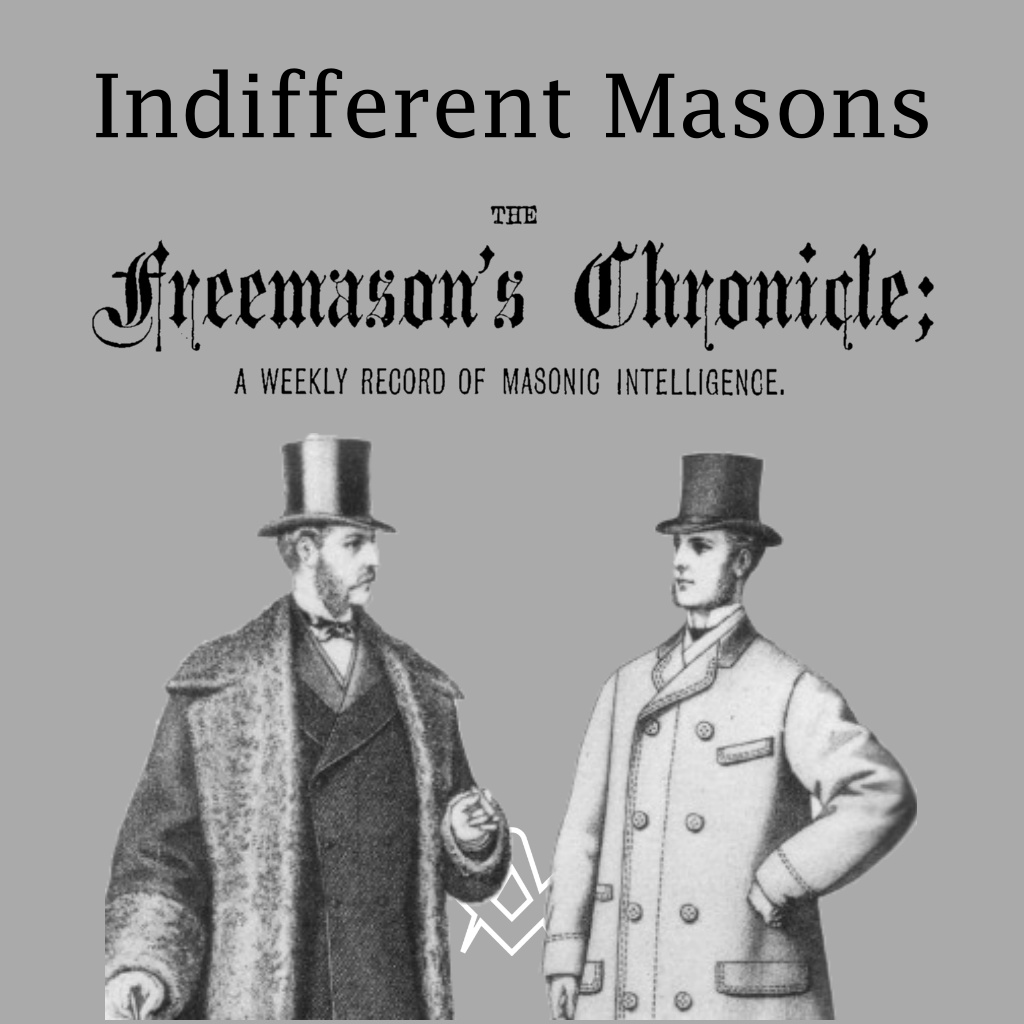Unfortunately, nothing really changes in Freemasonry.
An article Indifferent Masons, From Le Monde Maçonnique December 1874.
French translation published in The Freemason’s Chronicle 20th February, 1875
Among Freemasons indifference to the duties and efforts of the grand Institution to which they have sworn to lend their aid is worse than a grave error; it is a desertion in the very face of the enemy—a true act of treason.
Devoted to the inquiry after Truth and the conquest of Justice, Masonry, in spite of the violence and gross enmity of which it has been the object, is ever struggling” with energy against error, prejudices and superstition, against oppression and deceit.
In such a work it has a right to look for support to all who seek an asylum at its hearth and are anxious for enlightenment from its teaching.
But this assistance, in order to be useful and efficacious, must be active and thorough.
No soft heartedness is possible; no lukewarmness tolerable.
Eager and earnest permissible hearts can alone be really serviceable to our grand and fraternal Association.
As inconsistent Masons, so indifferent Masons have done Freemasonry all the harm they possibly could without actually destroying it.
It is these who paralyze our efforts and render them futile. It is these who make our Lodges empty and who keep aloof those who would prove the earnest and fittest defenders of our cause.
It is this in-difference, which, passing on from one spot to another, freezes the hearts of the Brethren, extinguishes our enthusiasm, and surrounds us with that cold atmosphere which paralyzes the strongest will.
An indifferent Mason is not only a useless member of our Craft, he is hurtful, corrupting, by his noxious influence, all who surround him, and impeding the clue performance of our labours.
He is a true paralytic, almost indeed a corpse, which we are dragging after us and which hinders and delays all our movements.
Nothing that interests our fellows, nothing that can in any way contribute to the amelioration of their lot and the development of their intellectual and moral faculties, should be indifferent to men of feeling,
– and more especially to Masons, whose obligations are greater, and who, having entered our Order freely and unconstrainedly, have duties devolving upon them, all the more important that they have been contracted freely.
In the meantime, the number of indifferent brethren appears for some time past to have been continuously increasing.
Whence arises this abnormal state of things ? Clearly from several and various causes.
The excuses which go to justify the unjustifiable neglect of Masonic duties are—
“Powerlessness of Masonry to fulfil its programme, the senselessness of its aims, the futility and barrenness of its labours”—
wretched arguments which only react on those who use them; for if Masonry is powerless, its objects vain, its labours barren and of no effect, we can only, in reason, lay the blame on the half-heartedness and indifference of its workmen.
We must seek then elsewhere the true causes of the evil which gives us so much concern.
In our opinion indifferent Masons may be classed under three chief categories..
1. Those who, having entered the Order with an exaggerated idea of the influence and power of Masonry, have experienced discouragements, and discovered the error of their views.
These, the natural bent of their minds, induces them to exaggerate, just as they had done their early aspirations.
2. Those who, having entered young into our Order, have dispelled or lost, in the varying struggles of life, all their hopes and the noble sentiments which animated their youth.
3. The ambitious vulgar, who only joined Masonry in order to seek a protection which it was impossible to give them.
Of these three categories, the first may easily be recalled to a more rational way of viewing their position; the second, though almost incurable, deserves our pity.
As to the third, incorrigible and incapable of inspiring us with the slightest interest we can only urge on the brethren who compose it to renounce at once and for ever their title to be regular Masons.
A sense of honour forbids them to remain any longer members of a body which they discourage by exhibiting towards its labours the most intense disdain.
To these three classes of indifferent brethren we might have added a forth, more numerous still, which comprises of those Masons who are always ready to be guided by the influence of those who surround them; but we have thought it better not to insist too strongly on the weakness of such Brethren, but to encourage them by good example to re-awaken their zeal and become once again really useful and active members of the Craft.
Indifference, adding its ravages to those inflicted by the late war has, during the last four years especially, weakened French Masonry.
Our Lodges have been partially deserted, and notwithstanding the efforts of the most devoted members, the duties languish and are unproductive.
Against the dangers which such a position involves, it is the duty of all who are sincerely attached to our Institution to combat with the utmost energy.
The general elections have recently taken place in all the district Lodges.
May the newly elected officers signalise their accession to power by a merciless war against this mortal enemy of our great family.
May they pursue, unrelentingly, even to its last retrenchments, and afford in all circumstances, to the lukewarm and hesitating, the comforting example of zeal and activity.
All well disposed men are ready to give their efforts, to labour earnestly with them to restore to our Lodges the life and energy which are deserting them.
In this work of restoration, hesitation is impossible, devotion will not fail of its influence.
And since indifference is, of all the dangers which menace us, the greatest and most pressing, let us, at this moment, and everywhere throughout French Masonry [and all Freemasonry worldwide], have but one thought, but one aim, but one rallying cry: —
” Guerre aI’ indiffercnce!”
[ War of Indifference ]
(Signed) Camlet
– The Freemason’s Chronicle 20th February, 1875
 The Freemasons Chronicle, a weekly record of masonic intelligence, was first published 2nd January 1875 London, England as an independent weekly journal of masonic interest and continued for 27 years.
The Freemasons Chronicle, a weekly record of masonic intelligence, was first published 2nd January 1875 London, England as an independent weekly journal of masonic interest and continued for 27 years.
It should be the business of a journal devoted to the interests of the Order to attempt the removal of prejudices such as these, which, though they may have little perceptible influence upon the prosperity of the Fraternity, yet have the effect of preventing timid or ill-informed persons from enlisting under its banner.
It will not only attempt to keep pace with the growing literary requirements of the day, but it will seek to exhibit the Order to the non-Masonic world divested of its technical details, and clothed in the garb of Charity and Brotherly Love.
The questions of the hour, which exercise the minds of thoughtful men, will be handled freely and broadly, without any tinge of political or sectarian bias.
The memoranda of Masonic gatherings which will appear from week to week, will be full and accurate; and as free interchange of opinion is one of the best signs of life and vigour in any society, ample scope will be given for Correspondence on topics of interest to the Order.
If we may venture upon a new rendering of words which recent events have made memorable, we will say here, once and for all, that we will be keen men of business, and will spare no effort, consistent with honour, to achieve commercial success; but first, and before all things, we will prove to our brethren and the world that we are FREEMASONS.
Recent Articles: The Freemason's Chronicle
 Operative And Speculative Masonry Explore the fascinating transition from Operative to Speculative Masonry in our latest post. Discover historical insights from Augustus C. L. Arnold and Rev. Wm. P. Strickland, shedding light on Freemasonry's evolution and its enduring principles. Dive into the rich history and significant milestones that shaped modern Freemasonry. - The Freemason's Chronicle - 2 September 1876 |
 Discover the true essence of Freemasonry, an ancient order founded on the profound principles of love for God and man. It's a call to rise above mere appearances, to embody genuine virtue and benevolence, transcending societal pretense. Embrace the transformative power of simplicity, and let the authentic glories of Freemasonry inspire your path. |
 Discover the intriguing story of a man who became a Mason but openly professed his dislike for the institution. Unravel the peculiar circumstances that led him down this path and explore the unexpected consequences that followed. Dive into this thought-provoking account that challenges our notions of loyalty and reveals the complexities of human nature within the Masonic fraternity. |
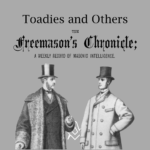 In the realm of Masonry, the principles of equality and respect are paramount. Yet, the presence of toadies—those who obsequiously seek favour from the influential—threatens these ideals. While Masonry embraces diverse beliefs and backgrounds, it rejects the sycophantic behaviours of toadies, flunkeys, and tuft-hunters, urging members to uphold genuine respect and self-worth. The Freemason's Chronicle - 22nd January 1876 |
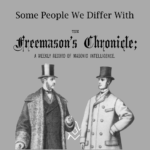 Unveiling the Unpleasant: Some People We Differ With Discover the intriguing dynamics of quarrels within the Masonic brotherhood. From the cantankerous to the litigious, the peevish to the vengeful, delve into the characters that challenge fraternal harmony. Explore their motives, temperaments, and the art of navigating disputes with these fascinating brethren. Brace yourself for a riveting journey into the world of conflicting personalities. |
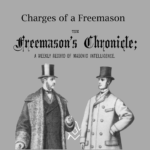 Unravelling the Masonic Mystique: A Deep Dive into the Freemasons' Charges - Explore the intricate world of Freemasonry, its principles, rituals, and the mechanisms for resolving internal disputes. Discover how this ancient fraternity fosters unity, promotes moral conduct, and upholds the sanctity of its secrets, while navigating the complexities of modern society. - The Freemason's Chronicle - 4 December 1875 |
 Unlock the hidden lessons of Masonic Studies! Don't settle for superficial knowledge or mere rituals. Discover the true depth and meaning behind Freemasonry. Expand your understanding of Tracing-Boards, Lectures, and more. Join regular Lodges of Instruction to enhance your Masonic journey. Become a knowledgeable Freemason, not just a token-bearer. Unleash the power of true Masonic wisdom today! |
 Uncover the incredible story of how Masonry saved the life of a Crimean War foot soldier in this historical and masonic account. Through the first hand experience of a soldier engaged in fierce hand-to-hand combat, witness the fateful encounter with a Russian Freemason that changed the course of his life. Learn how brotherhood and a deep dedication to the craft can lead to unforeseen and life-saving circumstances on the battlefield. |
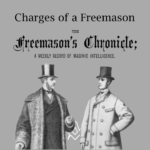 The Freemason's Chronicle - Charges of a Freemason The secrets of Masonry are the exclusive property of the Craft, and can never be communicated to one who is a mere labourer and not an accepted Mason. Hence, no labourer, that is, one who has not been regularly initiated in a legal Lodge. Article first published in The Freemason's Chronicle, 27 November 1875 |
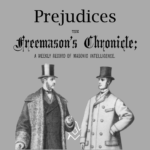 The Freemason's Chronicle - Prejudices Prejudices are partial judgments in favour of, or against certain persons or things, and, for convenience sake, may be ranged in two categories—those which are, comparatively speaking, harmless, and those which are harmful. Article first published in The Freemason's Chronicle, Oct. 2 1875. |
 The Freemason's Chronicle - Cliques Is Freemasonry - a Clique ? Man has been defined as a gregarious animal, but in his highly civilised condition he is gregarious only to a limited extent. First published in The Freemason's Chronicle, Oct. 2 1875, addresses the same challenges then as now. |
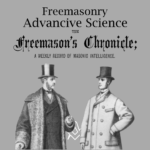 The Freemason's Chronicle - Freemasonry - an Advancive Science Is Freemasonry - an Advancive Science ? Not to confuse advancement with innovation. Has it been the case that Freemasonry's survival for 300 years plus is due to being an Advancive Science, tending to advance. First published in The Freemason's Chronicle 18 September 1875, addresses the same challenges then as now. |
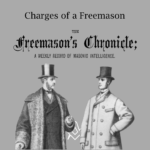 The Freemason's Chronicle - Charges Of A Freemason An interpretation of the "Charges of a Freemason", written Bro. Cornelius Moore and published in 1875, that introduce certain opinions that for some readers, will not sit well in contemporary times. - The Freemason's Chronicle, Sept. 11, 1875 |
 On The Order Of The Temple And Its Doctrine. THE Order of the Temple is divided into two great classes, denominated respectively the Order of the Temple and the Eastern Order. The Eastern Order gave birth to the Order of the Temple, and in the course of time has become an appendage of the latter. It is in ancient Egypt that we find the cradle of the Eastern Order. The Freemason's Chronicle, Sept. 4, 1875 |
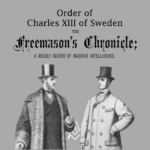 Order of Charles XIII of Sweden The following translation of the Manifesto of King JL Charles XIII of Sweden, on the occasion of his establishing the Masonic Order which bears his name, and of the Statutes of the said Order, may be interesting to our readers. The Freemason's Chronicle, Aug. 28, 1875 |
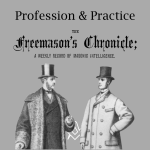 Most of our readers in the course of their experience, have doubtless met with enthusiastic brethren who take it for granted that a Mason can do no wrong. These enthusiasts are thoroughly convinced that the vast majority of those who join the Order are the most benevolent, the most moral, and the very noblest members of society. - The Freemason's Chronicle 10 July 1875 |
 An article investigating the relationship between masonry and citizenship. Are the principles of Freemasonry aligned with the freemason's claim to be a better citizen of the world? The Freemason's Chronicle - 19 June 1875 |
 A visitor must make clear his identity to the satisfaction of the Lodge he proposes to visit. More than once have we been asked to explain our views as to the reception of strangers in a Lodge. - The Freemason's Chronicle - 29 May 1875 |
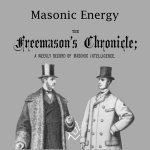 Is there reason in the accusation that Masonic energy looks only to a course of good feeds, when we can point to such grand results as have been achieved in these latter years, both in respect of the extension of our Order ? - 1May 1875 |
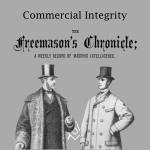 Implementing Freemasonry's peculiar system of morality in our day to day business affairs was the topic of this article, Commercial Integrity, first published in The Freemason's Chronicle - 8 May 1875 |
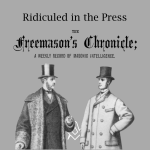 Ridicule has been somewhat illogically described as the test of truth. If it were so, Freemasonry ought to have perished long since. Two press reports from May 1875 covering the |
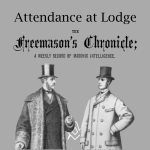 There are many things which Freemasonry will do for a man in the way of opening his mind and giving him larger and kindlier views of life, but Freemasonry itself, cannot eradicate the natural bias of the disposition. |
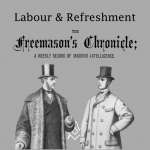 There is, we fear, too marked a tendency in very many Lodges to hasten through its labours, with a view to entering, as soon as possible, upon the business of refreshment. - The Freemason's Chronicle 17th April, 1875 |
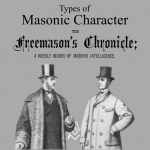 Another example that demonstrates that nothing really changes in Freemasonry. In an article the Types of Masonic Character published 145 years ago in The Freemason's Chronicle 10th April, 1875 |
 A brief history on the relationship between the British Monarchy and the craft - The Freemason's Chronicle 20th March , 1875 |
 What are the qualities of a convivial man and how does this dovetail perfectly in to Freemasonry ? 16th March, 1875 |
 A review of the "Sketch for the History of the Dionysian Artificers," a fragment, by Hyppoli to Joseph Da Costa - This little work may be regarded as, so to speak, the Holy Grail of Masonry. |
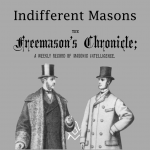 Nothing really changes, an article Indifferent Masons, From Le Monde Maçonnique 1874. Translation published in The Freemason's Chronicle 20th February, 1875 |
 In handling an intruder in the lodge, we endeavoured to show that a good Mason should be a gentleman, and a sincere man. The Freemason's Chronicle 20th February, 1875 |
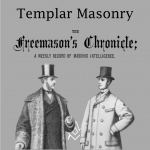 Templar Masonry - a historical aspect of the Religious and Military Order of the Temple published in The Freemason's Chronicle 13th February, 1875 |
 Secrecy perhaps the strongest objection urged by the enemies of the Masonic Order against its existence published in The Freemason's Chronicle 20th March 1875 |
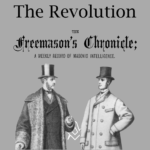 Freemasonry In The United States during And After The Revolution We take a look at Freemasonry in the United States during and after the Revolution first published in The Freemason's Chronicle - February 6, 1875 |
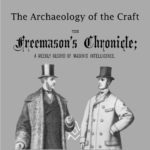 We take a look at the archaeological connection with the Craft, first published in The Freemason's Chronicle - January 30, 1875 |
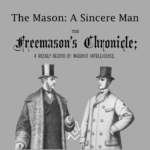 What it means to a Freemason to be a sincere man. Extract: first published in The Freemason's Chronicle - January 23, 1875 |
 What it means to a Freemason to be a citizen of the world ? First published in The Freemason's Chronicle - January 16, 1875 |
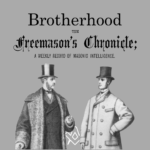 Brotherhood! In that one word what sympathetic associations arise. First published in The Freemason's Chronicle - January 9, 1875 |
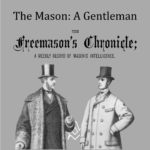 This opening article was written 145 years ago, yet it resonates with Freemasons today as it did then. First published in The Freemason's Chronicle, January 2, 1875, Issue 1 |
masonic knowledge
to be a better citizen of the world
share the square with two brothers

click image to open email app on mobile device



